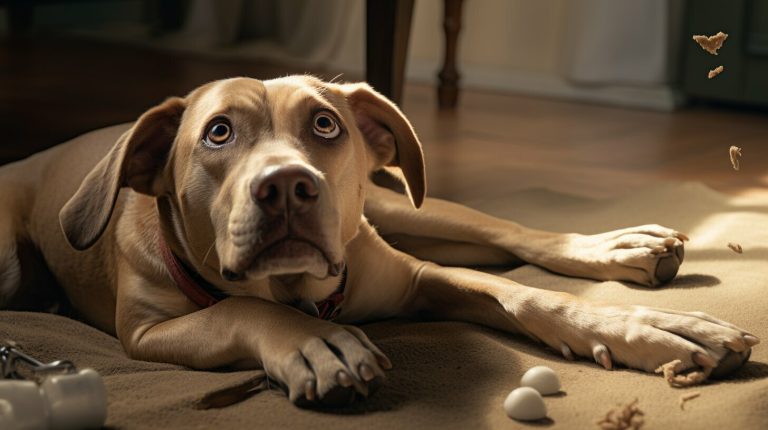Why is My Dog’s Nose Dry? Unraveling the Canine Mystery!
Have you ever wondered why your dog’s nose is dry? It’s a common concern for pet owners, but fear not! Let’s uncover the truth behind this mysterious phenomenon and debunk some myths along the way.
Key Takeaways:
- A dry nose doesn’t always mean a dog is sick or dehydrated.
- Dogs primarily sweat through their paw pads, not their noses.
- A wet nose doesn’t always indicate good health.
- Practical reasons for a dog’s dry nose include weather conditions, age-related changes, allergies, or dehydration.
- Ensure hydration by offering water and using natural treats that stimulate thirst.
The Truth Behind a Dry Dog Nose
Contrary to popular belief, a dry nose in dogs doesn’t always mean something is wrong. As a dog owner, it’s essential to understand that a dog’s nose can vary in moisture levels throughout the day. Just like humans, dogs’ noses can be dry in certain situations without any cause for concern.
One common reason for a dog’s dry nose is after sleep. When your furry friend wakes up from a nap or a good night’s rest, their nose may temporarily be dry. This is perfectly normal and happens because dogs tend to breathe through their noses while they sleep, causing the moisture to evaporate.
Weather conditions can also play a role in a dog’s nose being dry. During hot and sunny days, the heat can dehydrate your dog, leading to a drier nose. On the other hand, colder weather can make the nose dry and even slightly cracked. Just like how our skin can become dry in extreme temperatures, dogs’ noses can experience similar effects.
| Causes of Dry Nose | Common Myths |
|---|---|
| After sleep | A dry nose means sickness or dehydration |
| Weather conditions | A wet nose always means good health |
| Age-related changes | Only sick dogs have dry noses |
Despite these common causes, it’s important to note that persistent dryness, cracking, or other changes in your dog’s nose should be monitored. If you notice any concerning symptoms, it’s recommended to bring them to the attention of a veterinarian. They can help identify any underlying health issues and provide appropriate treatment.
As a responsible pet owner, you can take preventive measures to keep your dog’s nose healthy. Ensuring proper hydration is crucial, so always have fresh water available. You can also try using dog-specific nose balms or applying small amounts of coconut oil to moisturize the nose. Removing allergens from their environment and using dog sunscreen can also protect their nose from further damage.
Remember, a dry nose in dogs is not always a cause for alarm. By understanding the truth behind it and taking necessary precautions, you can help keep your furry friend’s nose in optimal health.
Practical Reasons for a Dry Dog Nose
There are various practical reasons why your dog’s nose might be dry. It’s important to understand that a dry nose doesn’t always indicate sickness or dehydration in dogs. In fact, dogs primarily sweat through their paw pads, not their noses, so a wet nose doesn’t necessarily mean that your furry friend is in perfect health.
One common reason for a dry dog nose is simply after they wake up from a nap. Similar to us humans, dogs can experience a bit of dryness in their noses after sleeping. Additionally, weather conditions can play a role in drying out your dog’s snout. During hot and dry climates, or even in cold weather when indoor heating is used, your dog’s nose may lose moisture and become dry.
As dogs age, they may also experience changes in their nose. Just like how our skin can become drier and less supple with age, a dog’s nose can undergo similar changes. Allergies can also contribute to a dry nose in dogs. If your dog is allergic to certain substances in their environment, such as pollen or dust mites, it can lead to dryness and irritation in their nose. Lastly, dehydration can cause a dry nose. Ensuring your dog is properly hydrated by offering them fresh water and using natural treats that stimulate thirst can help maintain a moist snout.
| Possible Causes of Dry Dog Nose | Symptoms |
|---|---|
| After sleep | Dryness after waking up |
| Weather conditions | Dry nose in hot, dry climates or cold weather with indoor heating |
| Age-related changes | Gradual dryness and less supple nose with age |
| Allergies | Dryness and irritation due to allergic reactions |
| Dehydration | Lack of moisture in the body leading to dry nose |
While these practical reasons for a dry dog nose are typically harmless, it’s important to monitor any changes in your dog’s nose. If you notice persistent dryness, cracking, bleeding, or any other concerning symptoms, it’s recommended to consult with a veterinarian. They can help determine if there are any underlying health issues causing the dry nose and provide appropriate treatment if needed.
When to Seek Veterinary Attention
While a dry nose is usually harmless, it’s important to know when to involve a veterinarian. If your dog’s nose is consistently crusty and dry, it could be a sign of an underlying health issue that requires treatment. Additionally, if your dog’s nose is accompanied by other symptoms such as nasal discharge, lethargy, loss of appetite, or difficulty breathing, it’s crucial to seek veterinary attention as soon as possible.
A veterinarian will be able to examine your dog’s nose and conduct any necessary tests to determine the cause of the dryness. They may also check for signs of infection, such as redness or swelling, and perform blood work or imaging if needed. Early detection and proper treatment can help prevent further complications and ensure your dog’s overall well-being.
Remember, every dog is unique, and what may be normal for one dog may not be for another. It’s always better to err on the side of caution and consult with a professional if you’re unsure about your dog’s nose health. Your veterinarian is the best person to provide guidance and advice tailored to your specific furry friend.
| Symptoms | When to Seek Veterinary Attention |
|---|---|
| Consistent dryness and crustiness | Seek veterinary attention to determine underlying cause |
| Nasal discharge, lethargy, loss of appetite, or difficulty breathing | Immediate veterinary attention required |
| Redness, swelling, or signs of infection | Consult a veterinarian for examination and possible treatment |
Remember to always monitor your dog’s nose for any changes and consult with a veterinarian if you have any concerns. By staying proactive and seeking professional advice when necessary, you can ensure your furry friend’s nose health and overall well-being.
Preventive Measures and Treatments
To prevent and treat your dog’s dry nose, there are several measures you can take. Ensuring proper hydration is crucial, so make sure your furry friend always has access to fresh water. You can also offer natural treats, like Bully Sticks Central’s range, that stimulate thirst and help keep your dog hydrated.
Another effective way to combat dryness is by using dog-specific nose balms or coconut oil. These products provide much-needed moisture to the nose and help prevent cracking and flakiness. Simply apply a small amount onto your dog’s nose and gently massage it in.
It’s also important to remove allergens from your dog’s environment, as allergies can contribute to a dry nose. Regularly clean your dog’s bedding, vacuum the house, and avoid exposing your dog to known allergens.
If you plan on spending time outdoors with your dog, remember to protect their nose from the sun. Just like humans, dogs can get sunburned, and their noses are particularly vulnerable. Look for a dog-friendly sunscreen and apply it as instructed, especially if your dog has light-colored or thin fur.
| Preventive Measures | Treatments |
|---|---|
| Ensure proper hydration | Use dog-specific nose balms or coconut oil |
| Offer natural treats that stimulate thirst | Remove allergens from the environment |
| Protect your dog’s nose from the sun | Consult a vet for severe cases |
Potential Health Issues
Various health issues can contribute to your dog’s dry nose. It’s important to be aware of these potential causes and take appropriate measures to ensure your furry friend’s well-being.
One common health issue is allergies. Dogs, like humans, can be allergic to certain substances in their environment, such as pollen, dust mites, or certain foods. These allergens can cause inflammation and irritation in the nose, leading to dryness. If you suspect allergies, it’s advisable to consult with a veterinarian who can recommend appropriate tests and treatments.
Autoimmune diseases are another potential cause of a dry nose. These conditions occur when the immune system mistakenly attacks the body’s own tissues. In some cases, this can lead to dryness and crustiness of the nose. A vet can diagnose and provide treatment options to manage autoimmune diseases in dogs.
Distemper, a highly contagious viral disease, can also manifest as a dry nose in dogs. Along with a dry nose, symptoms of distemper may include coughing, fever, nasal discharge, and respiratory problems. Vaccination is the best way to prevent distemper, so make sure your dog’s vaccinations are up to date.
| Health Issue | Symptoms | Treatment |
|---|---|---|
| Allergies | Inflammation, irritation, dryness | Consult with a vet for tests and treatments |
| Autoimmune diseases | Dryness, crustiness | Vet diagnosis and treatment options |
| Distemper | Dry nose, coughing, fever, nasal discharge | Vaccination for prevention |
It’s also important to consider other factors that can contribute to a dry nose in dogs. Blocked tear ducts or dry eye, for example, can cause the nose to become dry. Fever, hyperkeratosis (thickening of the nose), hereditary nasal parakeratosis, and even sunburn can also be potential culprits. If you suspect any of these issues, it’s best to consult with a veterinarian for a proper diagnosis and appropriate treatment.
In conclusion, a dry nose in dogs can be caused by a variety of health issues, ranging from allergies to autoimmune diseases and viral infections like distemper. It’s important to pay attention to any changes in your dog’s nose and seek veterinary attention when necessary. By providing proper care, hydration, and using preventive measures such as dog-specific nose balms or sunscreen, you can help keep your furry friend’s nose healthy and happy.
Conclusion
Understanding the reasons behind your dog’s dry nose can help you ensure their overall well-being. Contrary to popular belief, a dry nose doesn’t necessarily indicate sickness or dehydration. Dogs primarily sweat through their paw pads, not their noses, and a wet nose doesn’t always mean good health.
There are practical reasons why a dog’s nose may be dry, such as after sleep, in response to weather conditions, or as a result of age-related changes. Allergies and dehydration can also contribute to dry noses in dogs. To maintain proper hydration, it’s important to offer your dog water and provide natural treats that stimulate thirst, like those from Bully Sticks Central.
While occasional dryness is usually nothing to worry about, persistent dryness, cracking, or other changes in the nose should be monitored and brought to the attention of a veterinarian. These symptoms may be indicative of underlying health issues, including allergies, autoimmune diseases, distemper, blocked tear ducts or dry eye, fever, hyperkeratosis, hereditary nasal parakeratosis, or sunburn.
Thankfully, there are preventive measures and treatments that can help keep your dog’s nose healthy. Keeping them well-hydrated, using dog-specific nose balms or coconut oil, removing allergens from their environment, and applying dog sunscreen can all contribute to maintaining a healthy nose. If symptoms persist or worsen, it’s always recommended to consult a veterinarian for more severe cases and professional advice.
FAQ
Why is my dog’s nose dry?
A dry nose in dogs is a common concern for pet owners, but it doesn’t always signal illness. Dogs primarily sweat through their paw pads, not their noses, and a wet nose doesn’t always indicate good health. There are practical reasons for a dog’s dry nose, such as after sleep, due to weather conditions, age-related changes, allergies, or dehydration.
When should I seek veterinary attention for my dog’s dry nose?
While a dry nose alone doesn’t necessarily mean your dog is sick, persistent dryness, cracking, or other changes in the nose should be monitored and brought to the attention of a veterinarian. Some possible health issues that can cause a dry nose include allergies, autoimmune diseases, distemper, blocked tear ducts or dry eye, fever, hyperkeratosis, hereditary nasal parakeratosis, and sunburn.
How can I keep my dog’s nose healthy and prevent dryness?
Ensuring hydration can be achieved by offering water and using natural treats that stimulate thirst. You can also use dog-specific nose balms or coconut oil to moisturize the nose. Removing allergens from the environment and using dog sunscreen can also help. Consulting a vet is recommended for more severe cases.
- Discovering Why Do Women Wear Lipstick: A Deeper Look - 19/12/2023
- Why Do Golfers Only Wear One Glove? - 16/12/2023
- Why Don’t Hobbits Wear Shoes? - 14/12/2023
Hi, I’m Rhiannon, the lead author behind The News Wire. As a passionate journalist, I strive to bring you the latest news and updates from all over the world. With a keen eye for detail and a dedication to unbiased reporting, I aim to deliver well-researched and informative articles that keep you informed and engaged. From breaking news to in-depth analyses, I cover a wide range of topics with the aim of keeping you in the loop. Join me on The News Wire as we explore the dynamic and ever-changing landscapes of global events, uncovering the stories that matter most.






